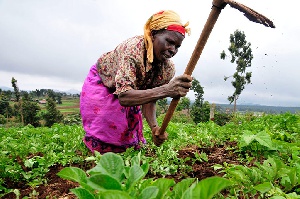- Home - News
- TWI News | TV
- Polls
- Year In Review
- News Archive
- Crime & Punishment
- Politics
- Regional
- Editorial
- Health
- Ghanaians Abroad
- Tabloid
- Africa
- Religion
- Election 2020
- Coronavirus
- News Videos | TV
- Photo Archives
- News Headlines
- Press Release
Business News of Saturday, 14 May 2016
Source: B&FT
Sinking agric sector affects livelihoods
The Chief Executive Officer of Association of Ghana Industries (AGI), Mr. Seth Twum- Akwaboah, has said the agricultural sector’s decline, which is a major growth-pillar of the economy, has affected livelihoods in the northern sector.
He said agriculture has recorded a declining growth rate for the past few years, with its share of Gross Domestic Product (GDP) dropping by12.8 percent within seven years.
“The contribution of the agricultural sector is likely to drop further in 2016 as government has cut its 2016 expenditure on the sector by GH?40million -- despite growth in the sector stalling to 0.04 percent this year when government had targetted 3.6 percent growth,” he said.
Mr. Twum-Akwaboah was speaking on the sidelines of the maiden edition of the Market Development Programme for Northern Ghana agribusiness forum in Tamale.
He bemoaned that much of the efforts to increase standards of living in the Northern sector has been on improved health care and education, instead of focusing on the agricultural sector to boost production so as to enhance the livelihoods of rural dwellers.
"We need to consider poverty reduction and increasing farm incomes in equal measure, since the Sustainable Development Goals give priority to poverty reduction," he said.
According to him, agriculture provides employment for an estimated 71 percent of the economically active populations in the three regions of the north -- indicating the extent to which indigenes depend on agriculture for survival.
“The pattern of migration and settlement spreading across the country is a reflection of the disparity in distribution of economic activities, especially between the North and South,” he said.
He noted that people get attracted to areas of economic activities, hence any effort aimed at bridging the gap should be encouraged by considering the enormous potential that exists in the northern sector for boosting economic activities.
“In restoring agriculture to its deserved status, it is important to re-visit some of the barriers that have stifled growth in the sector.”
He said most financial institutions are unprepared to extend credit for agricultural activities due to the perceived risk associated with the sector, with many banks established to provide agriculture financing to farmers now turning their attention to commercial activities.
He stressed the need to support the sector for development that will provide the needed food security for the country, adding that a development bank for agribusiness is therefore needed.
He urged government to mandate financial institutions to dedicate a minimum of their total lending portfolio for agribusiness so as to boost the industry.
He admonished insurance companies to assist farmers to insure their livelihoods for a better future.
Entertainment










